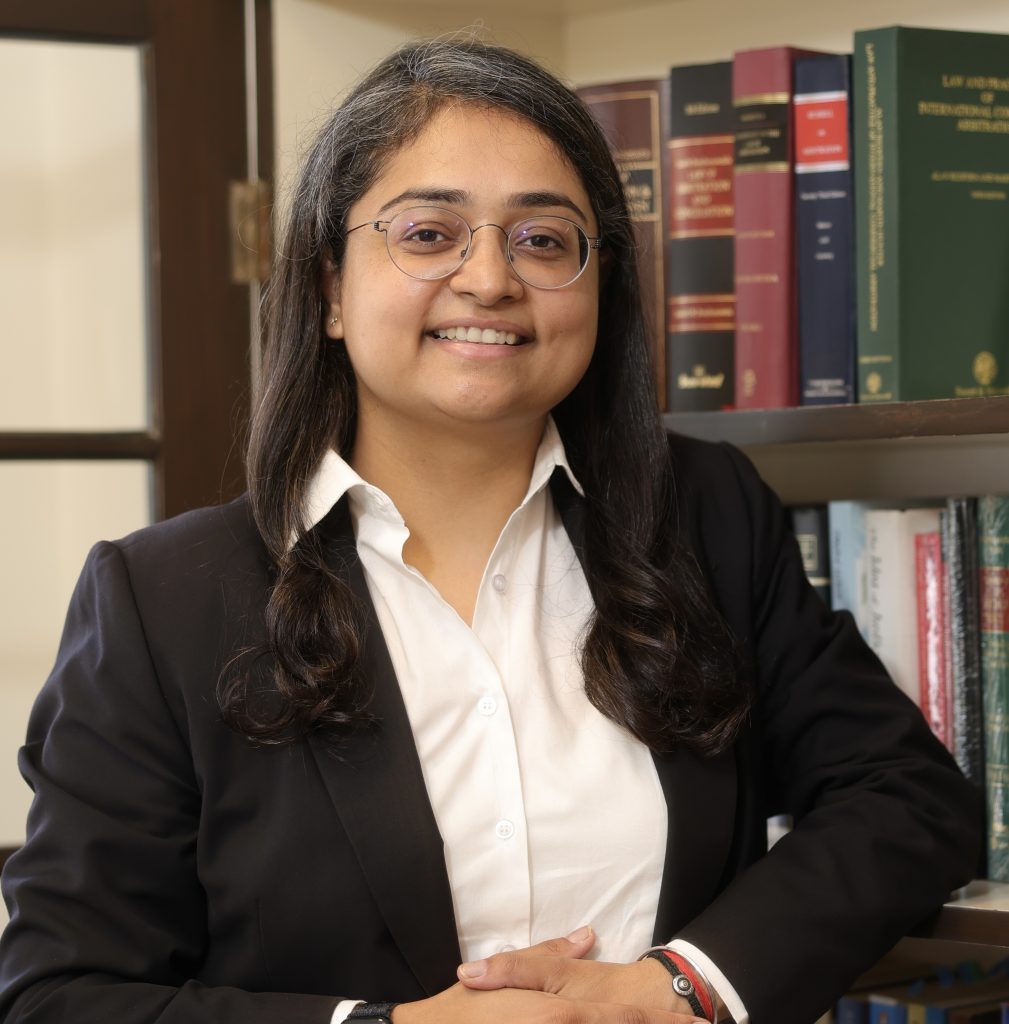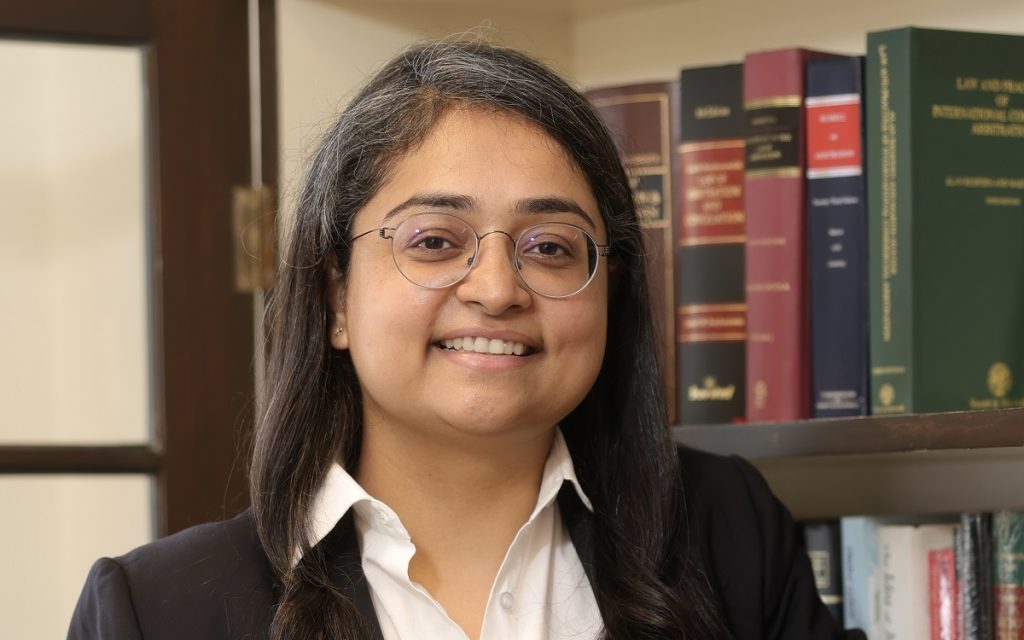This interview has been published by Anshi Mudgal and The SuperLawyer Team

From graduating top of your class at NALSAR to training with Allen & Overy in London and Prague, how did your early international exposure shape your approach to dispute resolution and arbitration in India?
It was transformational. The vacation scheme (akin to an internship) at Allen & Overy (now A&O Shearman) felt like an introduction to a whole new world back in the day. So naturally, I was very excited when I got selected as a Trainee Solicitor at A&O in 2012, straight out of NALSAR, Hyderabad. As a Trainee Solicitor, you had to work for six months each in different practice areas. I had a great time working with the best legal minds in banking law and corporate law. In particular, I learnt and enjoyed the most while working on international commercial arbitrations under the guidance of Angeline Welsh, (now Kings Counsel) at the London office and investment treaty arbitrations under the guidance of Matthew Hodgson at the Prague office.
Being exposed to such complex disputes, multinational clients and the best solicitors and barristers in the field of arbitration, at the very start of my career, was an amazing learning experience for me. I am grateful to this day for the training that I received at A&O, especially under someone as brilliant as Ms. Welsh. The excellence and professionalism with which we worked at A&O is something that has stayed with me till today. I approach all my matters with the same vigour, professionalism and discipline. It is because of this training that I am confident of advising my clients in India and across the globe independently on international commercial arbitrations. My international arbitration practice in India is built on the early exposure I had at A&O. In later years, with referrals by former colleagues and seniors from A&O, I have been fortunate to assist foreign law firms in some international commercial arbitrations, on matters arising under Indian law.
What inspired you to transition from a global law firm environment to establishing your own chamber practice in Delhi? What were some of the key challenges you faced during that shift?
The transition from A&O to my own chamber practice has been a rather interesting journey with challenges aplenty. I quit A&O due to a combination of personal and professional reasons. I had already qualified as a Solicitor of England & Wales in 2014 and there were various job opportunities offered to me by A&O at their other overseas offices. However, I knew that my heart was in litigation so I decided to take the plunge and come back to India with a vision to someday have my own Chamber.
The challenge with this decision was that I was entirely clueless of what the right way forward was, after coming back to India. I started off with Amritsar District Courts since I belong to Amritsar, Punjab, and later joined a lawyer’s office in the Punjab and Haryana High Court. Soon thereafter, I felt compelled to try the final frontier of litigation for me – Delhi. I came to Delhi with no job in hand and applied relentlessly to all the top lawyers and disputes practices I knew. Most of them rejected my application. But I knew I had to make it work and there was no going back. I may have lost confidence by so many rejections, but I never lost hope. I knew I was meant to be in Delhi and I just needed to wait. Within a few days, I found an office that would form the foundation of my future practice. I started working with HMJ Manmeet Pritam Singh Arora in 2015 and I cannot express in words my gratitude to her as she made me the lawyer I am today. In litigation, if you find the right mentor and you have the hunger to succeed, nothing can stop you from growing. With encouragement and support from her and Mr. D. S. Narula, Sr. Adv., I set up my own Chamber in 2018.
I realised that while setting up your own Chamber practice is one challenge, the bigger challenge is maintaining your client base, and the biggest challenge is growing your practice, given the tough competition in Delhi. That is where impatience kicks in because growing your practice happens at a consistent but gradual speed. The remuneration commensurate with your effort, also comes in much later. In the age of instant gratification, that can seem very disheartening especially if one falls prey to comparisons with other colleagues who may be growing at a much faster pace. However, if there is one thing that I steer clear of, it is comparison to others. I have come to realise that everyone is fighting their own battles at their own pace and all one can do is be sincere and diligent in their own efforts without comparing their circumstances to others. No two people will have the same background, or education or opportunities or capability or intelligence or luck even. You can only control your life and your actions. I have seen my cause list / clients grow organically and there is no greater joy in seeing your growth on your own terms, with hard work, sincerity and integrity. This growth would of course not have happened without my team. While different associates have come and gone, I am extremely thankful to my clerk, Naved Khan, who has been with me since Day 1 and who singlehandedly manages all the back-end administrative tasks for the Chamber letting me focus entirely on my legal practice.
I must add here that the support I have got from the Judges and the bar at the Delhi High Court has been phenomenal. This Court has encouraged me and given me room to grow and that is all I could have ever asked for as a first generation lawyer. The Hon’ble Judges have appointed me as a Sole Arbitrator, Amicus Curiae, Local Commissioner / Court Auctioneer in several matters. If the Court where you are practising is entrusting you with matters, that is the biggest encouragement you need as a first generation lawyer with no legal pedigree.
Having said that, there still exist biases in litigation and arbitration, especially towards women. The legal community needs to acknowledge that and take steps to promote more women in this profession, especially as Senior Advocates, Arbitrators and Judges. The profession can also feel exclusionary and elitist at times, and we need to do more to promote diversity and inclusion in our profession.
I have been lucky in as much as I have had great mentors in this profession who have held my hand during my most difficult times, especially when I have doubted myself. Destiny also was kinder to me in Delhi as I met the love of my life, Arshiya, within a few days of moving to Delhi. So all in all, despite the hardships, everything worked out when it had to. All I needed was some patience and faith. I continue to need it, as I work on growing my practice.
You represent PSUs and government organizations on sensitive matters including constitutional issues. What are some challenges unique to working with public sector entities?
Representing PSUs is highly rewarding, but can also get frustrating at times. For instance, for me, I am a panel counsel for Delhi Development Authority (DDA). Since I was not raised in Delhi, this panel provided me with the unique opportunity to learn about land related issues that are peculiar to Delhi, since DDA is one of the largest land owning agencies in Delhi. With this panel, I have had the privilege and opportunity to appear and argue complex arbitration matters, and constitutional matters as well. The biggest challenge in working with public sector entities is getting clear instructions, which sometimes may not come timely. You have to then be ready to bear the wrath of the judges and also work extra hard to make the case yourself from the limited information you have. Notwithstanding these challenges, I would highly recommend working with a Government / PSU panel because of the sheer variety of cases that you get exposed to and the learning and confidence that comes with the said experience.
Through your involvement with the Quarterly Bar Review, Delhi High Court as well as a Research Editor with the Milon K Banerji Arbitration Centre, MKBAC, NALSAR you regularly write and research on issues of legal significance. How do you believe academic writing strengthens legal practice?
Writing brings clarity of thought and conversely, if you have clarity of thought, you will make a good writer. Academic writing in any particular field of law definitely strengthens your legal practice. For one, you will be seen as a sector expert and it will be easier for clients to reach out to you on issues you have regularly written about. Second, to write an academic article, the level of research you do, enhances your knowledge and builds your confidence in that field. Third, it helps build connections with your peers and lastly, it greatly improves your drafting skills. It is very difficult as a practising lawyer, especially given the long hours we work, to find time to write academic articles. But it is certainly something that I aspire to do more often and encourage all young lawyers to as well.
You’ve been a vocal advocate for LGBTQ+ rights and speak on panels addressing the community’s legal concerns. How do you see the legal profession’s role in pushing for more inclusive rights in India?
Being a member of this community, it is my duty to speak and educate people on LGBTQ+ issues and legal concerns in this country. If I cannot fight for my own rights, how will I ever do justice and fight for my clients’ rights! The legal profession, by its very nature, being the upholder of human rights, ought to be inclusive. The majority of legal professionals I interact with, are keen to see the community grow and are keen to take the fight for equality forward. The lawyers who were representing the petitioners in the Supriyo batch matters are continuing to do a phenomenal job in raising awareness on LGBTQ+ issues and working towards legal solutions for the benefit of the community. I am excited to have joined hands with them.
Among the many matters you’ve handled, could you share one particularly challenging case whether due to its legal complexity, or procedural hurdles and how you navigated it?
What I love about litigation is that every day and every case is a new challenge. In my practice, I have worked on some really complex property disputes as well as given legal opinions on a couple of complicated international commercial arbitrations. What I have learnt is that even the most complicated matters, sometimes have their answers in first principles. Therefore, I always start from first principles and then navigate the development of the law in that area. My most challenging case is still ongoing and I will write about it when we have a judgment, hopefully, in our favour.
Being a poet and an avid badminton player, how do these creative and athletic pursuits contribute to your personal and professional growth in a demanding field like law and how do you manage your personal life with the professional pursuits?
Law is demanding and sometimes too serious a profession. There was no work life balance in my initial years in litigation. However, that is because I chose to work long hours, as I was driven by the desire to learn and open my own Chamber practice. I did not find time to either write poetry or play badminton then. It is only after about 8 years of rigorous hard work and long hours that I have finally come to a place where I can balance my personal life with my professional pursuits. However, I do firmly believe one has to find time and ways to destress beyond work else the profession can burn you out early on. Playing a sport helps your mental health and also makes you more disciplined with your physical health. Being both, physically and mentally fit, makes you more efficient and energetic at work. Spending quality time with your family and friends is very important for your mental health. I am blessed to have a partner and two families who have supported me in my journey so far and will, no doubt, support me in the longer journey ahead. It is my priority now to balance work in a way that I get to spend time with my loved ones, including my dog. I also love travelling and litigation gives you ample opportunity to travel and take good breaks during Court vacations.
With your experience across jurisdictions and forums, what advice would you offer to young lawyers who wish to build a meaningful career in arbitration and civil litigation?
I certainly feel that young lawyers today (although I do not consider myself too old to be giving this advice!) need to work harder because there is way more competition today than there was 10 years ago. While there may be more technology to assist them, at its core, civil litigation and arbitration require conceptual clarity. You have to understand what you are doing, why you are doing it, read bare acts, and not mindlessly follow formats or read only one line in a judgment and be happy with it. There are no shortcuts in this profession. Also, it is very easy to get swayed these days by social media profiles of legal influencers or the glamour reported at the top tier in the profession, especially in international arbitrations. That is not the reality. Reality is in the daily grind, in turning up day after day without fail, in being prepared for a matter even if it is the last matter on the list, in never giving up, despite the odds being stacked against you. Rewards will follow, but you have to put in the hard work. You have to be committed to your own growth on your own terms while never losing sight of the fact that you hold great power and responsibility as a lawyer. So be passionate, be diligent, be smart and run your litigation marathon with sincerity, humility and integrity. Surround yourself with people who will be happy with your growth. Most importantly, always be your biggest cheerleader.
Get in touch with Chand Chopra –




